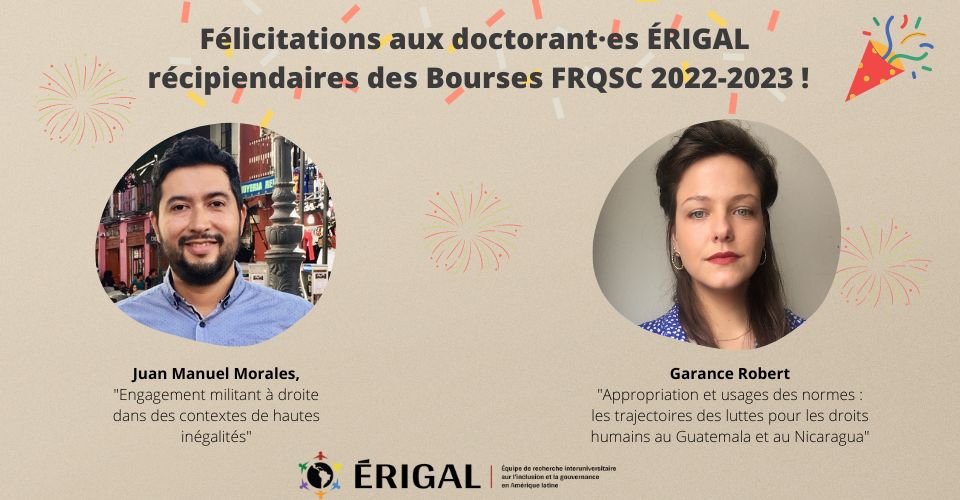Congratulations to ÉRIGAL PhD Students who received FRQSC Scholarships!

Juan Manuel Morales is a doctoral student in political science at the University of Montreal, under the supervision of Françoise Montambeault. Entitled "Right-wing Activism in Contexts of High Inequality ", you'll find below a summary of his thesis project:
In recent years, we have seen the dynamism of right-wing social movements defending issues such as capitalism, traditional values, a smaller state, punitive security, or closed borders. Brexit, the Tea Party, the Manif pour tous, the movement against the peace deal in Colombia, and the Free Brazil Movement are some examples of this trend (Pleyers 2019). Despite the importance of these movements and their impact on society and politics, social scientists tend to focus more on left-wing or progressive movements (Collovald and Agrikoliansky 2014). This preference is also evident in studies of activist engagement in Latin America, a region known for its salient inequalities (“World Bank Gini Index” 2022). However, after the left turn of the 2000s, there seems to be a revival of the right in the region (Levy and Larrabure 2021). Right-wing activism is particularly paradoxical in the case of Colombia, one of the most unequal societies in Latin America and a country that has never been governed by the left (Gamboa Gutiérrez 2019). Why do people engage in right-wing activism in contexts of salient inequality? Does the way activists interpret their support change according to their socioeconomic context? How do people navigate conditions of inequality within right-wing activism? I intend to address these research questions by conducting a comparative study of right-wing activisms in Colombia that incorporates the literature on social movements, activist engagement, and contestation by dominant groups.
Garance Robert is also a doctoral student in the Department of Political Science at the Université de Montréal, under the supervision of Françoise Montambeault (UdeM) and Delphine Lacombe (CNRS). Her dissertation project is entitled "Appropriation and uses of norms: the trajectories of human rights struggles in Guatemala and Nicaragua". It is based on the observation that although human rights are nowadays the object of extensive legal protection at the international level, and that a growing number of States recognize these rights at the national level, there are still areas in which the gap between norms and practices is immense. The countries of Central America are among those places where human rights continue to be systematically violated and where these norms are challenged by important groups in society. Despite this seemingly unfavorable context, many people continue to struggle for the use of this language and, in doing so, rely on human rights standards that are widely articulated in the international sphere.
With this in mind, this research project seeks to understand how and why actors who identify as "defenders" appropriate and rely on these human rights norms. To answer this question, it proposes to compare Nicaragua and Guatemala, considering their similar context in the 1990s (democratization and peace agreements), leading to a distinct trajectory. Indeed, while the guarantees of the rule of law in Guatemala are weak and have steadily diminished in recent years, many significant victories have been achieved by these movements. In Nicaragua, on the other hand, the suspension of individual freedoms has been total since 2018, after a gradual closure since 2006. The research aims to understand the reasons for the adoption of these human rights norms by "defenders", how these actors interpret and disseminate these norms, and finally, the links of these phenomena with their national contexts.
Again, congratulations to them!


